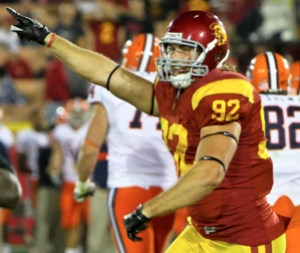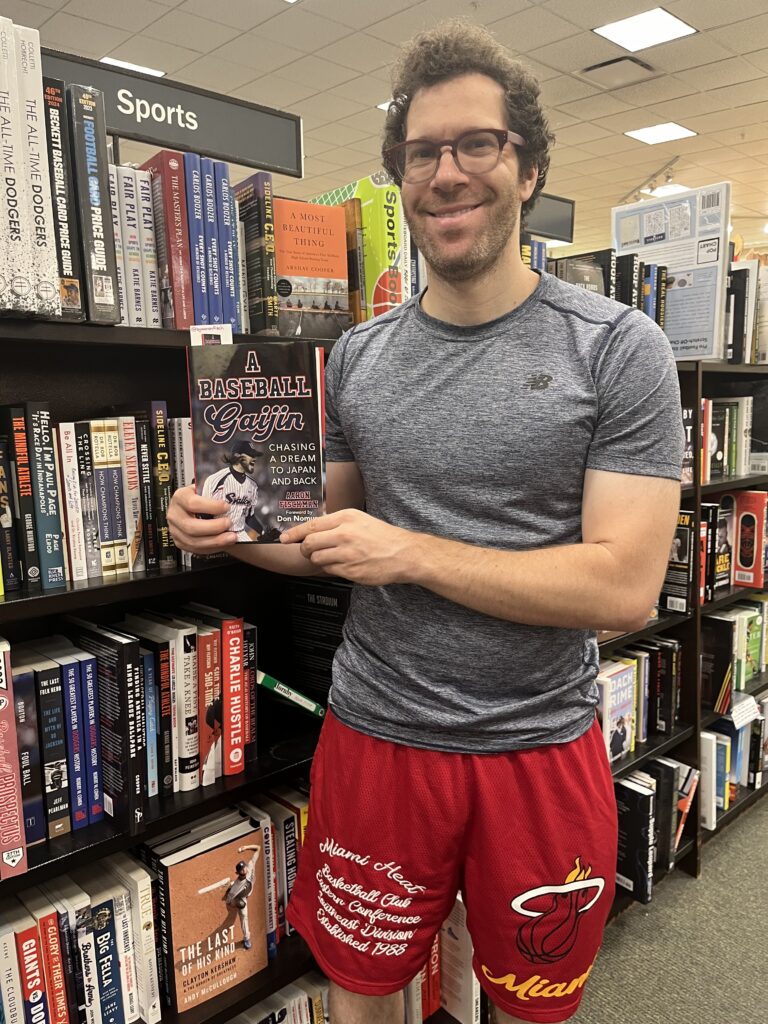Walk-On Zack Kusnir Contributes After NCAA Grants Medical Redshirt
 He probably does not appear in opposing teams’ game plans, but No. 92 is enjoying every second of being a Trojan football player, especially as the journey nearly came to an end three months ago.
He probably does not appear in opposing teams’ game plans, but No. 92 is enjoying every second of being a Trojan football player, especially as the journey nearly came to an end three months ago.
As a result of seasons lost to injury, Zack Kusnir petitioned the NCAA for a rare sixth year of eligibility.
“There was a little bit of anxiety waiting to hear back from the NCAA, whether they were going to grant me the year or not, but my parents and I got all the proper documentation,” said Kusnir. “We were just faithful that it would turn out for the best.”
As Kusnir awaited the decision this summer, he continued lifting weights and keeping in close touch with his coaches and teammates. “We would talk about it every day,” said defensive line coach Shawn Howe.
It was the decision he had been awaiting for most of the summer, and Kusnir didn’t have access to a phone. The NCAA notified the USC compliance office, who in turn called Kusnir’s father. Finally, Kusnir’s dad was able to reach his son, who was lounging poolside in his new apartment complex. The tech-savvy defensive lineman had been able to connect his Google Voice account to his iPad.
The NCAA’s decision was a “yes,” the same word Kusnir said in exultation as he pumped his fist by the pool. “I was by myself, just really excited,” said Kusnir.
“Just all these thoughts going through my head.
“(It) felt like a building was lifted off my shoulders.”
“I’ve never seen a guy, as a walk-on, come back for a sixth year,” said starting defensive tackle Antwaun Woods. “That shows how much he loves football.”
Unlike Woods, who was heavily recruited by USC, Kusnir was never offered a scholarship. He began his collegiate career as a quarterback with San Diego State, but transferred to USC after his freshman year. Despite Kusnir’s dreams of donning a USC football jersey, he originally came to USC because of a desire to join the Marshall School of Business.
Kusnir already finished his business administration bachelor’s degree in May, but was determined to continue attending USC regardless of whether or not his NCAA petition was granted.
“He said, ‘Hey, either way, I’m going to get this graduate degree,’” said Howe. “’I’d just love to be part of this university’s football team while I’m starting that process.’ He’s got his head down in academics. He knows that’s his future, and he pushes hard there.”
Kusnir is currently in his first semester of the two-year communication management master’s program at the Annenberg School for Communication & Journalism, but he plans on finishing in a year and a half.
“I’ve always known that having good grades would lead to success at one point or another, and my parents really instilled that in me when I was young,” said Kusnir.
Kusnir’s love for the university and the team has never been a secret. Every single practice, the sixth-year walk-on brings his passion to Howard Jones Field. It’s an energy that’s contagious.
Woods and Howe agree; Kusnir is the “leader of the walk-ons.” “He’s been walked-on for a couple years now, so he kind of tells them how it’s supposed to be done,” said Woods. “He’s like their coach.”
“I’m telling you, Zack’s always the first guy in line,” said Howe. “No question, those kids look to him, and rightfully so. These guys know everything he did to work to get back on this team and how important this is to him.”
Scholarship players get their education paid for in return for their contributions to the team. Walk-ons, like Kusnir, must be motivated by other factors, such as love for the game, competitive drive and feelings of brotherhood and community.
“All the walk-ons have a kind of close relationship in a way that we’re all similar in that sense,” said Kusnir. “We all love football so much that we’re willing to make a lot of sacrifices to go out there and spend a lot of time and energy on football.”
Even Woods, who was a four-star recruit coming out of Taft High School, draws motivation from Kusnir’s practice habits.
“When you see a guy like that that doesn’t have a scholarship, that’s paying to come here, that doesn’t have to be here, guys like that that come to work every day…it just pushes us,” said Woods.
“Scholarship guys can’t do all the work.
“We need those guys to give us a lift and just to be accountable, just like us.”
Kusnir does not like to discuss his past injuries, but the resilience he exhibited in spite of many setbacks was a character trait his parents stressed early in his development.
“They raised me properly, and they taught me to work hard for what I wanted,” said Kusnir. “If I wanted something, I had to work hard and get it, and when I was going to be faced with adverse situations in my life, I was going to have to push on through them.”
Every team has players like Kusnir – guys that aren’t recognizable to the average fan, but who pour their heart and soul into the team.
To every home game, Kusnir’s biggest fan, his mother Jeannie, wears a feathered boa around her neck. “Of course, I have his jersey number on it,” she said. By her estimation, Jeannie owns between 15 and 20 USC shirts, each with a particular number embroidered on them: No. 92.
Kusnir’s biggest supporter summed up the player and the person well: “He’s a great role model for any child. If they want to see somebody (succeed) with all kinds of adversity that he’s gone through…he’s got great grades, he’s a good athlete (and) he’s a good person.”
If you ask Zack Kusnir where he would rather be, he’ll say “nowhere.” He’s on his way to a graduate degree, while playing for one of the best college football teams in the nation. Pinch him. He must be dreaming.
Originally published by Neon Tommy.



